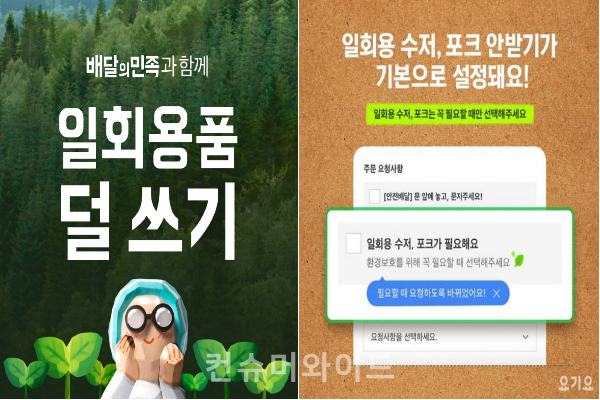
[Consumerwide_ HueSoung, Jun Reporter / Yohan, Bok Reporter] Delivery apps are initiating various activies for environmental protection. Along with a reusable container delivery service(refer to previous report), delivery apps are actively involved in reducing the use of disposable containers by providing 'not receiving disposable containers, disposable spoons and free side dishes' options.
Before offering this particular option, 'Not receiving disposable containers including disposable spoons and free side dishes', app users had to get those disposable containers and cutlery even if it was unnecessary for them. Eventually, those items were wasted and became a cause of environmental pollution. Free side dishes worked the same. However, after having the option of not getting those, now users can make a choice of consumption value.
Not receiving disposable containers and cutlery.
Delivery apps have changed the default option for disposable containers to 'Not providing' by June, 2021, in order to reduce disposable products. Upon the policy, users need to inquire separately for the disposable cutlery set on the time of order.
Among the three delivery businesses, only Baemin has been providing a 'Not receiving disposable cutleries' option since April, 2019. 26.79 million Baemin users based on accumulated records have participated in the 'Not receiving disposable cutleries' option by May this year.
Yogiyo is providing this option from August, which is 4 months later than Baemin. Since then, Yogiyo has reduced 714tCO2eq carbon by June 2021. This is the same effect as transplanting 110,000 pinetrees at 30 years old.
Coupangeats began their service in 2020, and they are also providing the 'Not receiving' option from June 2021 along with other delivery apps in order to reduce the use of disposable products.
Not receiving free side dishes.
In connection with reducing the use of disposable products, 'not receiving free side dishes' is one of the important consumption values for environmental protection. Baemin is providing the option for free side dishes from 21st of December, 2021. Yogiyo is also providing a 'Not receiving free side dishes' option in their app order menu to reduce food waste.
A Baemin-related person said, “Free dishes, including Kimchi, Kkakdughi have been provided along with the main dishes. Nevertheless, many times it has been wasted without consumption, which has resulted in increasing food and container waste. As we offer the additional option for free side dishes, we are expecting to reduce food waste and disposable containers."
Regardless of those efforts, there has been an increase in disposable waste in Korea.
Followed by 'The 6th waste statistics research' announced by the Ministry of Environment on the 27th of April, there had been a 2.2% increase between 2021 and 2022 in daily waste for one person at 950.6g from 2016 and 2017(929.9g). Use and waste of disposable products have increased as the disastrous Covid 19 was reaching the peak. Disposable products take up 37.32g of the daily waste from one person. This means that the yearly waste in Korea was 703,327 tons last year. Entire waste was made of paper waste including paper-cups and advertisement paper 49%, synthetic resin waste including plates and containers 41%, timber-based cutlery (chopsticks and toothpickers) waste 8.5%, metal waste from plates and container waste 1.5%.
Meanwhile, food waste has decreased compared to 5 years ago. The food waste for one person during a day was 310.9g, which is a 15.5% decrease from the time point of research, 'The 5th waste statistics research' (368g).
- [Consumption value-May project-Delivery app①] Delivery apps are practicing ESG by providing reusable containers for delivery
- [Consumption value-May project-Delivery app③] Delivery apps are accelerating value-consumption through practicing ESG work, including campaigns and volunteer work
- [Consumption value-May Project-Delivery app④] Delivery Apps are trying to lower delivery cost..Will this turn the consumer's choice?

